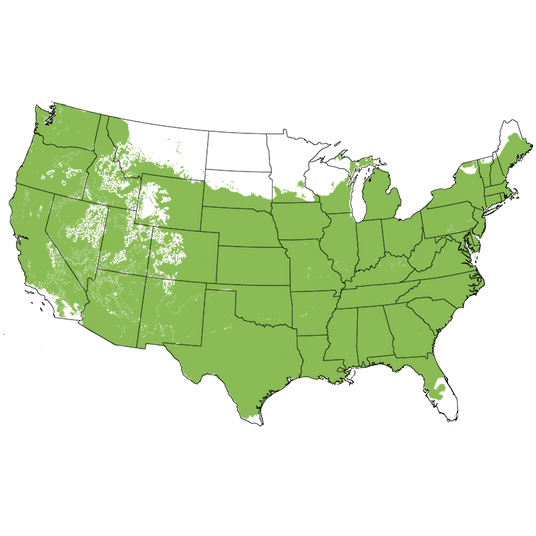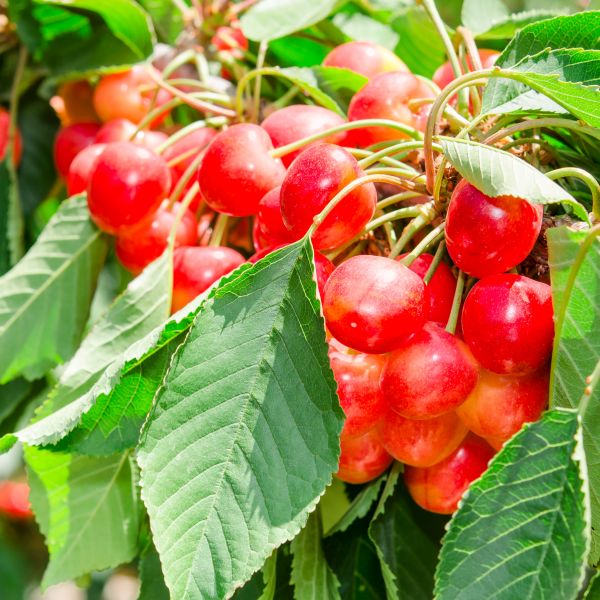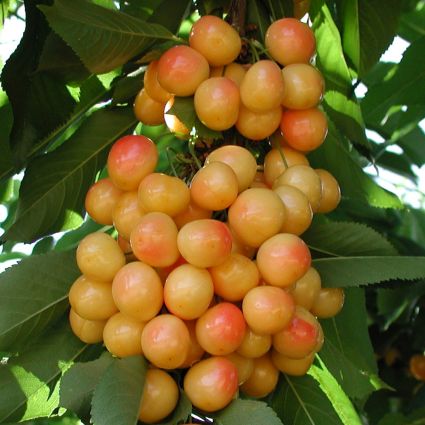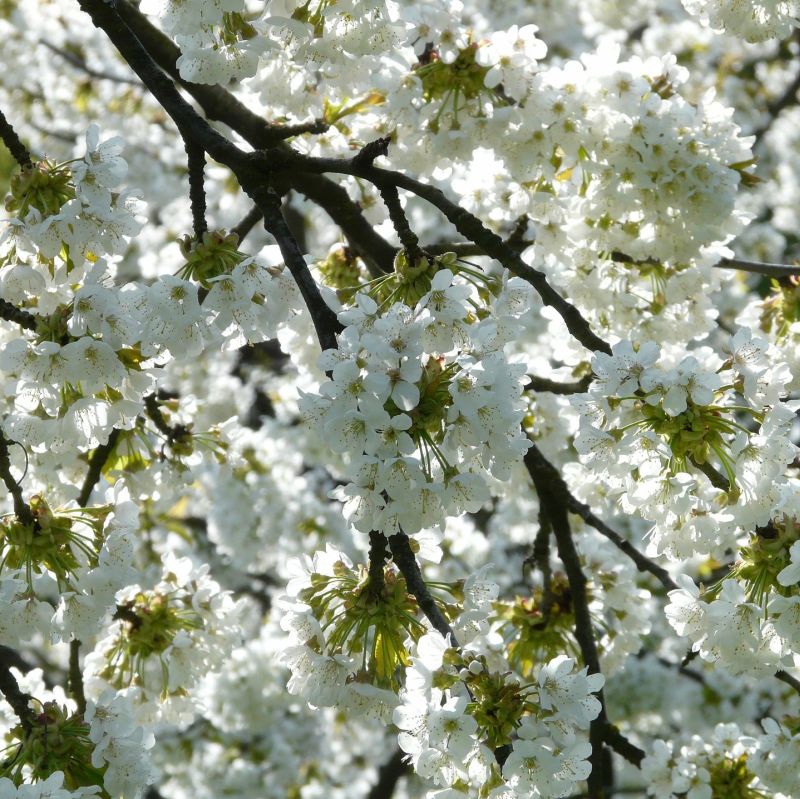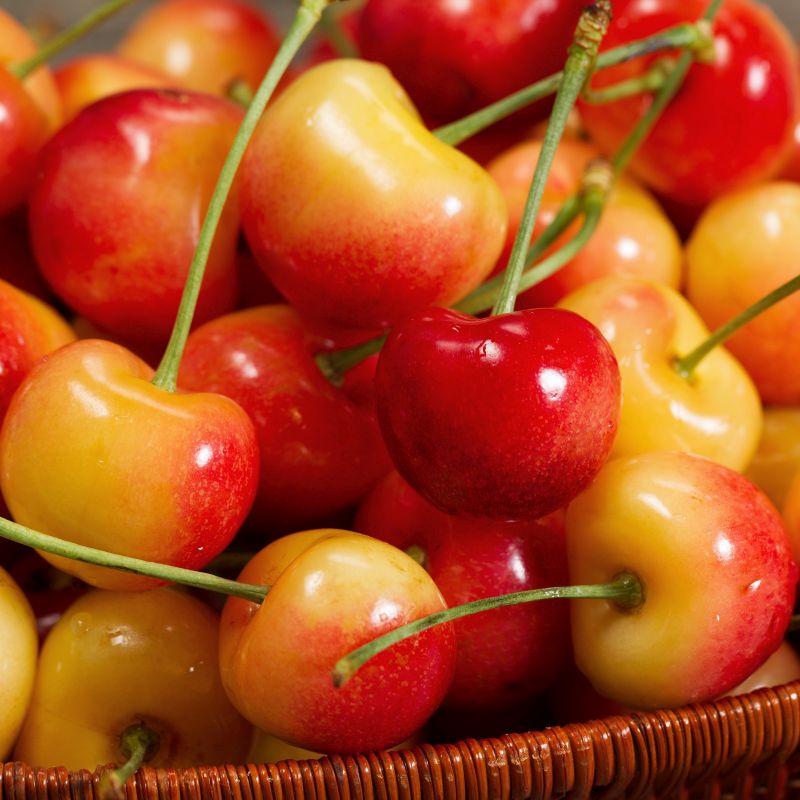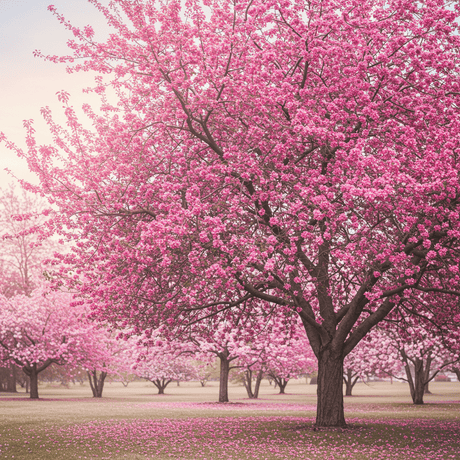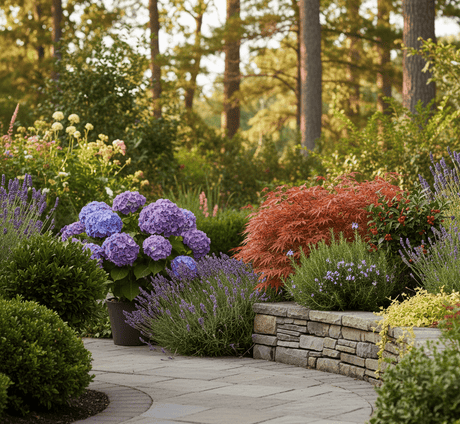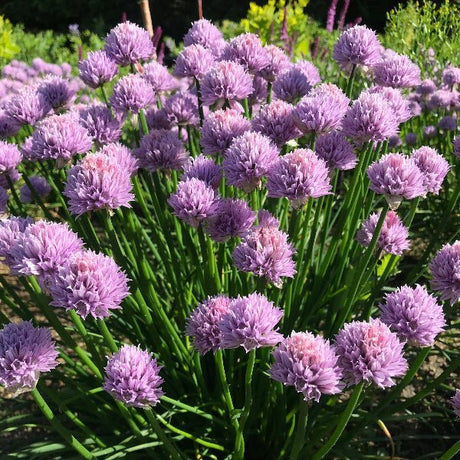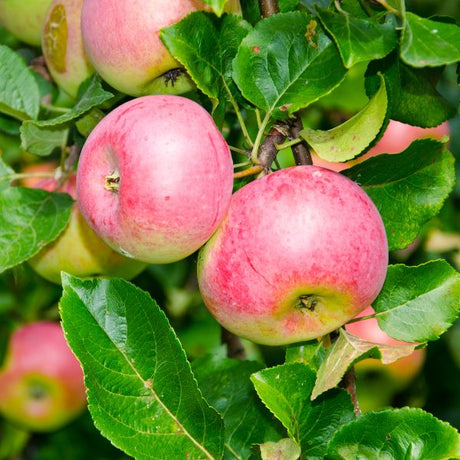Rainier Cherry Tree
Prunus avium 'Rainier'
Plant Sentry™
Plant Sentry™

Plant Sentry™ Protected
Your order is protected by our compliance system that:
- Prevents restricted plants from shipping to your state
- Ensures plants meet your state's agricultural requirements
- Protects gardens from invasive pests and diseases
Delivery and Shipping
Delivery and Shipping
Delivery and Shipping
Fast, Safe Plant Delivery
Ships in 3-4 business days • Tracking provided • Weather protected
| Under $50 | $9.99 |
| $50 - $99.99 | $14.99 |
| $100 - $149.99 | $16.99 |
| $150 - $198.99 | $24.99 |
| $199+ | FREE |
✓ Zone-specific timing • ✓ Professional packaging • ✓ Health guarantee
Understanding Plant Options
Nature Hills offers plants in two main formats:
- Container Plants: Grown in pots with soil, sized by container volume and plant age
- Bare Root Plants: Dormant plants without soil, sized by height measurements
Container Plant Sizes
Container sizes indicate plant age and growing capacity rather than liquid volume equivalents. Our containers follow industry-standard nursery "trade gallon" specifications, which differ from standard liquid gallon measurements.
Young Plants (6 months to 18 months old)
| Container Size | Actual Volume | Metric Equivalent |
|---|---|---|
| 2" x 2" x 3" | 0.18 - 0.21 dry quarts | 0.20 - 0.23 dry liters |
| 4" Container | 0.31 - 0.87 dry quarts | 0.35 - 0.96 dry liters |
| 4.5" Container | 0.65 dry quarts | 0.72 dry liters |
| 6" Container | 1.4 dry quarts | 1.59 dry liters |
| 1 Quart | 1 dry quart | 1.1 dry liters |
| 5.5" Container | 1.89 dry quarts | 2.08 dry liters |
Established Plants (18 months to 2.5 years old)
| Container Size | Actual Volume | Metric Equivalent |
|---|---|---|
| 2 Quart | 2 dry quarts | 2.2 dry liters |
| #1 Container | 2.26 - 3.73 dry quarts | 2.49 - 4.11 dry liters |
| 5" x 5" x 12" | 3.5 - 4.3 dry quarts | 3.85 - 4.74 dry liters |
Mature Plants (2-4 years old)
| Container Size | Actual Volume | Metric Equivalent |
|---|---|---|
| #2 Container | 1.19 - 1.76 dry gallons | 5.24 - 7.75 dry liters |
| #3 Container | 2.15 - 2.76 dry gallons | 8.14 - 12.16 dry liters |
Large Plants (3-5 years old)
| Container Size | Actual Volume | Metric Equivalent |
|---|---|---|
| #5 Container | 2.92 - 4.62 dry gallons | 12.86 - 20.35 dry liters |
| #6 Container | 5.25 - 6.01 dry gallons | 23.12 - 26.42 dry liters |
| #7 Container | 5.98 - 6.53 dry gallons | 26.34 - 28.76 dry liters |
Bare Root Plants
Bare root plants are sold by height from the root system to the top of the plant. Plants may exceed minimum height requirements.
Common Sizes:
- Trees: 1 foot, 2 feet, 3 feet, 4 feet, 5 feet, 6 feet
- Shrubs & Perennials: 1 foot, 18 inches, 2 feet
Important Notes
Container Volume Specifications
- Trade Gallon Standard: Our containers follow industry-standard "trade gallon" specifications established by the American National Standards Institute (ANSI Z60.1) for nursery stock
- Volume Variations: Actual soil volume may vary due to plant root systems and growing medium settlement
- Age Indicators: Container size primarily indicates plant age and maturity rather than liquid volume equivalents
Growing Conditions
- Plant size can vary based on variety and growing conditions
- Container size helps indicate plant maturity and establishment level
- Larger containers generally mean more established root systems and faster landscape establishment
Seasonal Availability
- Bare root plants are available seasonally when dormant
- Container plants are available throughout the growing season
- Specific varieties may have limited availability in certain sizes
Questions?
For questions about specific plant sizes or availability, please contact our plant experts who can help you choose the right size for your landscape needs.

Plant Sentry™ Protected
Your order is protected by our compliance system that:
- Prevents restricted plants from shipping to your state
- Ensures plants meet your state's agricultural requirements
- Protects gardens from invasive pests and diseases
Plant Profile & Growing Essentials
Cold hardy, Flowering, Edible, Ornamental Berries/Fruit, Attracts pollinators, and Thornless
Specifications
Specifications
-
Botanical Name
-
Height
-
Width
-
Growing Zones
-
Sunlight
-
Growth RateModerate
-
Flower Color
-
Leaf Color
-
Fall Color
-
Pollinator FriendlyYes
-
Pollinator Required
-
FragrantYes
-
Bloom PeriodLate Spring
Planting & Care Instructions
Planting & Care Instructions
A Sweet Cherry Worthy Of Its Fame
Meet the legendary Rainier Cherry Tree (Prunus avium 'Rainier') - the world's most sought-after Sweet Cherry! This early-bearing beauty delivers juicy, golden-yellow fruit blushed in red, and its flavor is nothing short of divine. Bursting with sweetness, Rainier boasts 20–25 Brix sugar levels - higher than even the famous Bing Cherry! Its creamy white flesh is crisp, luscious, and dripping with summertime sweetness.
Bred at Washington State University and named after the majestic Mount Rainier, this hybrid between Bing and Van Cherries combines beauty, productivity, and flavor perfection. In spring, its pink-tinged white blossoms cover the branches before rich green leaves appear. As fall arrives, the foliage turns warm shades of golden bronze, ensuring year-round interest.
Rainier's upright, rounded form makes it as ornamental as it is fruitful. A prolific, low-maintenance tree, it starts bearing young and provides a generous harvest for years. Whether you're a backyard orchardist or a casual fruit lover, Rainier Cherry will have you hooked from the very first bite!
>>Jump to Planting & Care Instructions
Key Features
- Exceptionally sweet, creamy white flesh with red-blushed yellow skin
- Bred from Bing and Van Cherry cultivars
- Early-bearing and heavy fruit production
- Pink-tinted white spring blooms attract pollinators
- Golden fall color and ornamental appeal
- High sugar levels (20–25 Brix)
- Great for fresh eating, baking, and preserving
- Needs a pollinator (Sweetheart, Black Tatarian, or Montmorency Sour)
Landscaping Uses
Rainier Cherry Trees are the ultimate double-duty edible ornamentals! Reaching 15–25 feet tall with a 12–18 foot spread, they're stunning enough for the front yard yet practical for the orchard or edible landscape.
Use them as a single specimen plant, in a pair for pollination, or in a high-density planting for small spaces. The spring bloom display rivals any flowering cherry, while the fruit-laden summer branches are irresistible to both people and songbirds!
Perfect Uses Include:
- Home orchard centerpiece
- Backyard shade tree
- Flowering specimen in mixed borders
- Edible landscape design
- Asian or cottage garden themes
- Bird-friendly gardens (consider bird netting)
Care & Maintenance
Hardy in USDA zones 5–9, Rainier is a deciduous fruit tree that thrives in full sun and rich, well-drained soil. Like most Sweet Cherry Trees, it appreciates good air circulation and morning sun to dry dew quickly and prevent disease.
Care Highlights:
-
Planting Time: Best planted in spring (bareroot) or anytime (container-grown) when the ground isn't frozen
-
Sun Requirements: Full sun (6+ hours daily), morning sun preferred
-
Soil Requirements: Rich, well-drained, loamy soil; avoid soggy sites or create a rain garden to improve drainage
-
Moisture Needs: Moderate, consistent moisture - use the Finger Test to check soil; keep evenly moist during establishment
-
Mulch: Apply a 3–4 inch layer of Arborist mulch to conserve moisture and insulate roots
-
Fertilization Needs: Apply balanced fertilizer in early spring before growth; compost or organic amendments are excellent
-
Pruning Info: Prune fruiting Cherries in late winter to open the canopy; perform size-control pruning in summer to keep under 10 feet
-
Renewal pruning: As needed to maintain vigor and airflow
-
Fruit Care: Thin fruit if necessary to improve size and quality
-
Special Perks: Drought-tolerant once established, deer-resistant, cold-hardy, and attractive to pollinators
-
Chill Hours: Approximately 700 required for fruit set
- Pollination Needs: Not self-fertile - requires a compatible variety like Sweetheart, Black Tatarian, or Montmorency Sour Cherry for optimal yields
Don't forget to order your Nature Hills Root Booster for lifelong symbiotic root support and improved transplant success.
Sweet Rewards From Your Own Rainier Cherry Tree
You don't have to visit a farmer's market or pay top dollar for premium Rainier Cherries - grow them right at home! With dazzling spring blooms, golden fall color, and unmatched fruit quality, this cherry truly offers year-round delight.
Order your Rainier Cherry Tree (and its pollination partner) from Nature Hills today - and start enjoying orchard-fresh, sweet-as-sunshine cherries in your own backyard!
Super Sweet Yellow Cherry
The Rainier Cherry was a stroke of luck. This selection was not what Washington State University hybridizer Harold Fogle had been expecting in 1952. After crossing a deep dark red Bing Cherry with a deep dark red Van Cherry one of the seedlings was a creamy yellow, slightly red blush-skinned cherry. It looked nothing like either of its two distinctive red parents. Fogle named this selection after Mount Rainier - one of the highest peaks in the Pacific Northwest.
The Rainier is exceptional sweet - much sweeter than either parent when measured in brix, a common sugar rating for fruit. Bing is rated at 17 brix and Van Cherry typically rates around 22 Brix, but the Rainier typically rates at 20 to 25 Brix or higher.
Pioneering fruit growers like Grady Auvil, founder of Auvil Fruit Company in Washington, was one of the first to see the potential in the Rainier Cherry. It produced exceptionally large fruit with sweet, yellow flesh.
Along with the obvious selling points came a few challenges for growers. The Rainier cherry has very thin skin, so the fruit is very sensitive to temperature, wind and rain. Birds eat an estimated 1/3 of the entire crop. This made the Rainier cherry a more expensive Cherry to grow commercially.
For many years, the Rainier was most commonly enjoyed as a home gardener's back yard tree. However, with more attention to commercial farming techniques, Rainier Cherries have now become a delicious common offering at stores and farmers markets each Cherry season.
